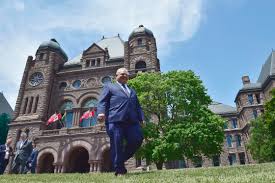Fix Our Schools was founded in 2014 with the goal of ensuring all of Ontario’s publicly funded schools were safe, healthy, well-maintained buildings that provided environments conducive to learning and working. With some notable successes along the way, we continue to work towards this goal as we head into 2021. But first, a necessary reflection on the past year and on how Ontario’s provincial government handled school infrastructure in this unprecedented year.
Ontario’s school buildings began 2020 with at least a $16.3-billion repair backlog. While this number is staggering, it notably does not even include First Nations schools, portables, accessibility retrofits, water quality, air quality, or asbestos abatement.
Throughout a year like no other, Ontario’s school boards continued to be at the mercy of provincial funding and policies. While the Ford government maintained annual funding for school renewal and repairs at $1.4-billion/year, this level of funding has been shown to be grossly inadequate since disrepair in Ontario’s schools has continued to increase every year.
In fact, when the Ford government released its budget in November 2020, political economist Ricardo Tranjan declared it to be “really bad for Ontario education”.
https://twitter.com/ricardo_tranjan/status/1324491092147011584?s=20
Amidst the COVID-19 pandemic, the Ford government actually shirked its responsibility to provide adequate, stable funding for schools and education when it ‘allowed’ school boards to dip into their own reserve funds to try to fund what was actually needed to ensure schools were safe, healthy environments.
Ford keeps saying “dip into your rainy day funds” to schools.
He knows schools aren’t revenue generating, and get their money from the government he administers, right?
— Stephen Punwasi 🏚️📉🐈☃️ (@StephenPunwasi) August 13, 2020
Throughout 2020, the Ford government continued to drag its heels on new school builds and expansions across the province, leaving us almost 2 years behind in this process.
Stunning new school from Arlington, WV.
When will new school be built in #Ontario? We had 13 months of silence on the annual process of approving new school builds and additions in this province. https://t.co/gFJ6ANokXT#onted #onpoli https://t.co/hdbHL6zMRu— Fix Our Schools (@Fix_Our_Schools) December 19, 2019
When schools were shuttered in late March 2020 and left empty for months, the Ford government missed the opportunity to invest in school repairs and improvements, such as accessibility retrofits, that could have been done much more safely without students in these buildings. Even for repair and renewal projects that were particularly relevant amidst the COVID-19 pandemic, such as those focused on improving ventilation in schools, the Ford government dragged its heels in allocating any funding to school boards to take action on improvements.
From the community of Earl of March Secondary School in #Kanata: "We have many interior classrooms that do not have windows. The school is 50 years old and the HVAC has never worked properly." #onted #onpoli @DrFullertonMPP #ottawa #carleton pic.twitter.com/zQ6BmMeCeb
— Fix Our Schools (@Fix_Our_Schools) September 11, 2020
At the same time that Ontario’s provincial government was unable to take the necessary action to invest in school infrastructure that would provide safe, healthy environments for learning and working, especially amidst a pandemic, our federal government was doing very little to ensure First Nations schools were safe. Many of Ontario’s First Nations schools still do not even have clean drinking water, let alone the type of infrastructure that would be safe and healthy during a pandemic.
https://twitter.com/cbcreporter/status/1298973279923793920?s=20https://twitter.com/cbcreporter/status/1298973279923793920?s=20
The Ford government also failed to make needed changes to an outdated regulation guiding the eligibility for and use of Education Development Charges, so developers continued to get away without contributing to school infrastructure, from which they profit.
Ontario NDP has long called on the province to allow TDSB to collect Education Development Charges & use it towards school repairs.
TCDSB already gets to collect fees from developers but not TDSB. This has meant losing badly needed 100s millions $ over the years. https://t.co/zMxSUx5AyM
— Bhutila Karpoche (@BhutilaKarpoche) September 22, 2020
Our provincial government chose to ignore an opportunity to fund any outdoor education plans, which could have been a helpful component of a safe return to school in September.
Today's @TorontoStar: "Toronto’s Catholic board expands outdoor learning pilot project to eight more schools as other boards keep an eye on the results"
Print headline: "SCHOOL’S OUT: Boards experiment with outdoor learning spaces to keep kids safer"https://t.co/rTM9MFnkiE— Fix Our Schools (@Fix_Our_Schools) October 13, 2020
And, since taking office in June 2018, the Ford government has refused to publish updated disrepair data for Ontario’s 5,000 schools. This data is collected with taxpayer dollars, and citizens deserve transparency into the state of school buildings.
Tomorrow! Along w/ @FamiliesPublic and @Fix_Our_Schools, we are participating in a Twitterstorm about ventilation in schools.
Ford & Lecce know all about the state of disrepair of ventilation in Ontario's schools – tell them to release the data to the public! #SafeSeptember pic.twitter.com/kuYn9vxjNd
— Ontario Education Workers United (@OntEdWorkers) August 23, 2020
Looking back on 2020, we realize a “silver lining” of the global pandemic relative to schools is that substantively more attention has been paid to the condition of school buildings. Ventilation, drinking water, and air quality may not be sexy topics, but Canadians now appreciate their importance. Media coverage of the state of school buildings was intense in 2020. With the ardent support of Fix Our School followers, we helped to keep a full conversation about safe, well-maintained schools in the press.
With your ongoing support, we intend to continue our work towards ensuring Ontario schools are safe, healthy, well-maintained buildings for all students and teachers. Onwards and upwards to 2021.

